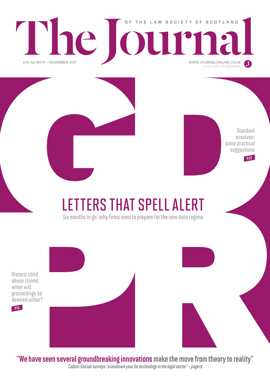Dealing with conflict

A recent Inner House decision, Aberdeenshire Council v JM [2017] CSIH 65 (18 October 2017), has clarified the procedure to be followed in opposed applications for welfare guardianship and the approach to be taken to the use of mental health officer (MHO) reports in such cases.
Background to the appeal
In JM, the local authority applied for welfare guardianship of an adult. His sister, the appellant, opposed this and sought her own appointment. The only dispute was over who should be appointed. The local authority MHO had prepared a report, lodged with the original application in terms of s 57 of the Adults with Incapacity (Scotland) Act 2000, which included observations about the appellant although it did not assess her suitability as guardian. Prior to proof, the sheriff ordained the same MHO to provide a second statutory report on the suitability of the appellant. This concluded that she was not suitable. After proof, the chief social work officer was appointed guardian in January 2016.
JM appealed to the Sheriff Appeal Court on the basis that the MHO had formed an “adverse view” of her when compiling the first report, so it was unfair for her to have assessed her suitability in the second report. The SAC refused the appeal, holding that the sheriff had reached his view not just on the basis of the two MHO reports but all the evidence (including that of the appellant), and it could not now disturb the findings in fact.
The appellant obtained leave to appeal to the Inner House on the point that a conflict of interest had arisen from the sheriff’s decision to ordain the original MHO to prepare the second report. The appellant also argued that the adult was potentially subject to a deprivation of liberty, and the procedure adopted had failed to provide him with adequate safeguards in terms of article 5 of the European Convention on Human Rights.
The appeal was refused as having no merit, but the judgment includes some observations about procedure which will be of interest to practitioners in this area.
Procedure for completing applications
The court analysed the procedure to be followed by an individual opposing an application for guardianship who themselves wishes to be appointed as guardian. It held that this does not constitute “an application subsequent to an initial application or proceeding considered by the sheriff” in terms of rule 3.16.8 of the Act of Sederunt (Summary Applications, Statutory Applications and Appeals etc Rules) 1999, but “a counter proposal for appointment of a different guardian made during the currency of an application which the court is still ‘considering’” (at para 21).
A competing applicant can therefore seek appointment by way of answers and does not need to lodge a separate minute (contrary to Cooke v Telford (2005 SCLR 367).
Delivering the opinion of the court, Lady Dorrian observed, however, that this would not be the case if an application in terms of s 57 had already been made and refused. It would presumably follow that opposition to a renewal of guardianship would require a minute, although this point is not specifically addressed.
The court also affirmed Arthur v Arthur 2005 SCLR 350 in holding that such a competing application is competent without the three statutory reports. This, however, does not preclude the sheriff “call[ing] for any further reports he considers necessary, including ex proprio motu a report from the mental health officer” in order to assist the court to determine suitability in terms of s 59 of the Act.
Fairness and article 5
The court rejected the argument that article 5 was engaged, but observed that if it had been, the scheme of the 2000 Act and its framework for judicial determination of applications, as well as the Mental Welfare Commission’s supervisory function over welfare guardians and local authorities, provided adequate safeguards.
In relation to the primary point about conflict of interest, the Division approved (at para 29) the Sheriff Appeal Court’s view “that the MHO could be expected to act in a manner independent from the local authority that seeks the appointment” in discharging her professional duties. There was also no reason why she could not make a separate assessment of the appellant in a second report even if she had formed “certain broad views” about her previously (para 28). The court also disagreed that any conflict arose from the fact that the MHO worked for the respondent local authority. The authority had a statutory obligation to secure the welfare of vulnerable adults within its area. In applying for appointment of the CSWO as welfare guardian, it was discharging this obligation, not advancing an “interest” which could come into conflict with that of the appellant.
It will be of interest to see how this analysis may be applied to the situation in which two individuals are competing for welfare guardianship, rather than an individual and a local authority.
In this issue
- Immigration detention: a case of overuse
- Sexual harassment: don't suffer in silence
- Child disputes: a quicker way through?
- Brexit: where are we now and what happens next?
- Reading for pleasure
- Opinion: Claire McKee
- Book reviews
- Profile
- President's column
- ScotLIS: the citizens' tool
- People on the move
- People matter
- Historic abuse: the fairness matrix
- Landmark year in legal IT
- Sentence, but no full stop
- Opening up arbitration
- Making the agent pay
- Equal pay: beware the mass claims
- Dealing with conflict
- Claims outside the rules
- Pension transfers – history repeating itself?
- Last instructions
- Scottish Solicitors' Discipline Tribunal
- Standard missives: an unachievable dream?
- SOLAR powered
- Disability rights
- Law reform roundup
- Too hard a drive?
- Settlement: can you avoid cheques?
- Q & A corner
- When 25 is the new 35
- Sorry; not sorry
- Ask Ash
- Plan sets ambitious 2017-18 targets
- Letting agents: prepare to register
- Paralegal pointers
- A way to make an impact






